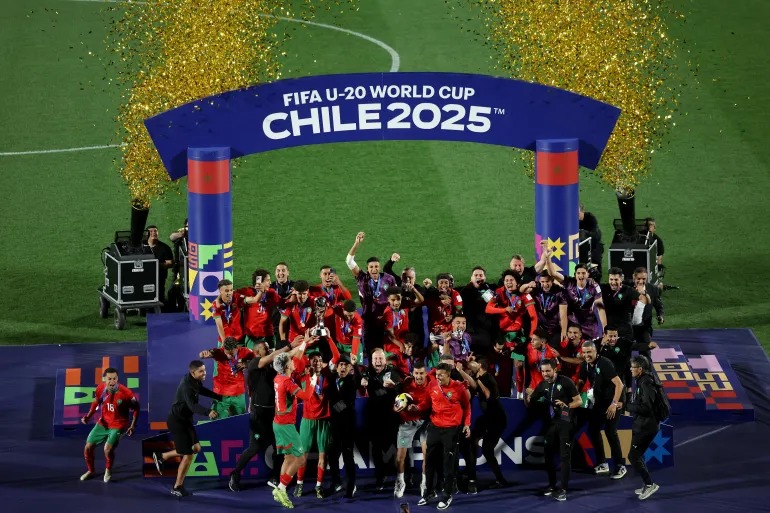Morocco crowned World Champions at U‑20 level: football crowns a royal vision and a people building the future
Abdellah Mechnoune
In a new moment of glory, Morocco has written its name in gold on the pages of the global football history, after the under‑20 national team won the 2025 World Cup, an unprecedented achievement that transcends the pitch to touch identity, willpower and the Moroccan state’s project to evolve into both a sporting and economic regional power.
This title is not only a sporting triumph but emblematic of a long journey that began years ago, in which football in Morocco has shifted from mere pastime to strategic lever led by His Majesty King Mohammed VI, through landmark initiatives such as the Mohammed VI Football Academy, investment in infrastructure, world‑class stadiums, and hosting continental and international tournaments while attracting top global clubs.
The victory over Argentina in the final, with a clean 2‑0 win, was not just a sporting surprise, but a manifestation of the capabilities of a young generation that reflects today’s Morocco: confident, professional and oriented towards long‑term planning. The performance of the Atlas Lions was exceptional — not just in technical strength but in discipline, team spirit and tactical awareness that conquered a storied team like Argentina.
Player Yasser Zabbiri, with his two goals in the final, embodied the ambition of this new generation, which today opens doors of hope for Moroccan youth that see sport as a field of international excellence rather than mere recreation.
Winning a global title is not only a sporting victory but also a strong message to the world: Morocco has become an African and Arab model in deploying sport as soft power, enhancing its image, attracting attention and asserting its readiness to embrace greatest challenges, including hosting the 2030 World Cup alongside Spain and Portugal.
Today, Morocco not only wins on the pitch, but also triumphs in politics, economy, investment appeal and its capacity to build an integrated development model in which different sectors engage and where field efforts are crowned by a clear royal vision.
And this success has also been manifested in the Kingdom’s notable diplomatic trajectory, which in recent years has seen a growing wave of international recognitions of the Moroccan Sahara and a multiplication of general consulates opened in the southern provinces, confirming broad support for Morocco’s sovereignty and territorial unity.
None of this happened by chance; it is the fruit of calm and effective diplomacy led by HM King Mohammed VI with steadfastness, reflecting the image of a Morocco that honours its commitments and commands respect regionally and globally.
With this historic achievement, Morocco cements its position as a “football school” producing promising talents across all age categories — which explains top European clubs’ interest in young Moroccans and strengthens global investors’ confidence in the stable and motivating environment that Morocco offers to those who bet on both sport and economy.
Whenever the Moroccan flag is raised on international podiums, the world is reminded that behind these successes lies royal leadership that made human capital a priority, youth the core of development, and sport a strategic project no less important than major national undertakings.
HM King Mohammed VI, with his clear‑sighted vision and his ongoing support for everything that elevates the Moroccan flag, affirms today that investing in the human being, in talent and in self‑confidence is the shortest path to glory.
Morocco does not simply collect titles; it harvests the fruits of a successful national project founded on dedication, seriousness and planning.
And if football has crowned Morocco globally today, tomorrow holds greater achievements in sport and across all fields, thanks to a people steadfast in their identity and a King who writes — with his people — the chapters of Morocco’s modern glory.








 English
English Español
Español Deutsch
Deutsch Français
Français العربية
العربية